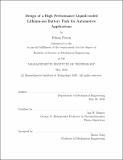Design of a high performance liquid-cooled lithium-ion battery pack for automotive applications
Author(s)
Perrin, Ethan(Ethan B.)
Download1197625729-MIT.pdf (3.857Mb)
Other Contributors
Massachusetts Institute of Technology. Department of Mechanical Engineering.
Advisor
Ian W. Hunter.
Terms of use
Metadata
Show full item recordAbstract
This thesis explores the design of a water cooled lithium ion battery module for use in high power automotive applications such as an FSAE Electric racecar. The motivation for liquid cooling in this application is presented with an adiabatic battery heating simulation followed by a discussion of axial cooling based on the internal construction of an 18650 battery cell. A novel design is proposed, implementing soldering the negative terminal of electroplated 18650 battery cells directly to a metal core printed circuit board material as the critical cell-to-water interface that provides high thermal conductivity while maintaining electrical isolation. Cold plate design, sealing, and manufacturing is discussed and implemented concluding with pressure and leak testing of a scale test article. Cell soldering efficacy is explored through testing of various low temperature solder alloys, fluxes, and surface plating to make recommendations on full scale module builds. A single cell test article is constructed and tested to validate thermal performance expectations with preliminary results suggesting constant power discharge rates of up to 60 W per cell is possible without overheating, which greatly exceeds the power requirements of existing FSAE Electric vehicles built by MIT Motorsports. Further work is needed to quantify solder joint reliability and examine thermal gradients present at the full module and pack scales.
Description
Thesis: S.B., Massachusetts Institute of Technology, Department of Mechanical Engineering, May, 2020 Cataloged from the official PDF of thesis. Includes bibliographical references (page 75).
Date issued
2020Department
Massachusetts Institute of Technology. Department of Mechanical EngineeringPublisher
Massachusetts Institute of Technology
Keywords
Mechanical Engineering.